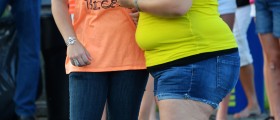Gallstone disease occurs when a solid mass of cholesterol, bile and calcium salts gets accumulated in the gall bladder. Researchers found that men who often lose and gain weight are more likely to develop gallstones than those who are maintaining constant weight.
The study included around 25,000 men whose BMI’s were taken into account. The study found that it was not obesity alone that increased the gallstones risk but fluctuations in weight that occurs when a person tried to lose weight and then regains it.
The study participants have been watched between 1988 and 1992 by sending questionnaires every two years from 1992 to 2002 to see whether they had developed gallstone disease.
The results showed that men who experienced weight cycling were at more risk of developing gallstones by 76% than the weight maintainers.
This has already been confirmed in women who are more predisposed to developing gallstones. In their case, besides fluctuating weight, hormones play a major role as well, so pregnancy is sometimes likely to trigger gallstone formation.
The study included around 25,000 men whose BMI’s were taken into account. The study found that it was not obesity alone that increased the gallstones risk but fluctuations in weight that occurs when a person tried to lose weight and then regains it.
The study participants have been watched between 1988 and 1992 by sending questionnaires every two years from 1992 to 2002 to see whether they had developed gallstone disease.
The results showed that men who experienced weight cycling were at more risk of developing gallstones by 76% than the weight maintainers.
This has already been confirmed in women who are more predisposed to developing gallstones. In their case, besides fluctuating weight, hormones play a major role as well, so pregnancy is sometimes likely to trigger gallstone formation.
Loading...
















